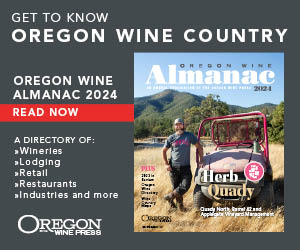Event Bill in Limbo

By Hannah Hoffman
Between legislative sessions, Yamhill County Commissioner Mary Stern chaired a statewide task force on regulation of non-farm activities in farm zones.
It was charged with producing a bill balancing the interests of boutique wineries, event-oriented destination wineries, farm stand operators, the rest of the agricultural world and Oregonians choosing country life for reasons other than occupation.
However, wine industry interests managed to gain control of the resulting legislation, creating a bill that would allow wineries all kinds of leeway to host and even cater events on their farmland.
On April 22, the Senate Committee on the Environment and Land Use voted not to approve any of the amendments that had been proposed and send the bill to the Senate Rules Committee for further work.
Republican Chuck Thomsen of Hood River, who sponsored Senate Bill 960, noted he hadn’t known how difficult and controversial such a bill would be. His committee colleagues agreed.
In fact, when Democrat Floyd Prozanski made the motion that sent the bill away, he said, “I move to refer this bill to any other committee,” at which everyone in the room laughed.
Thomsen and Prozanski weren’t exaggerating about the controversy surrounding SB 960.
Upon examining the most recent version of the bill, Stern said she could no longer support it, or recommend it to the agency that tapped her to chair the task force, the Association of Oregon Counties.
But now that it’s gone to another committee and there’s more time to work on it, Stern said she still supports it, especially if many of the proposed amendments can be scrapped.
It its present form with the current amendments, it would:
• Make most wineries outright permitted uses in exclusive farm use zones, thus not subject to the conditional use process.
• Allow them to host an unlimited number of loosely defined events, both public and private, as long as “wine produced in conjunction with the winery is featured.”
• Allow them to feature commercial kitchens in their facilities and bring in professional caterers for events held on their premises.
• Authorize counties to issue permits for a series of up to six events a year, instead of requiring a permit for each event, or even issue a blanket permit for “agri-tourism” endeavors not defined anywhere in the bill.
Stern said she was concerned about the undefined “agri-tourism” provision, as it could be stretched to cover the staging of helicopter or balloon rides — activities that could not be construed as discrete “events.”
She said she was even more troubled about the catering provision, as that would open the door to something approaching a full-service restaurant operation — never envisioned in lightly populated and slightly traveled parts of Oregon’s rolling hill country.
At present, she said, a winery wishing to add a kitchen and engage in hot food catering has to win authorization through a land use process designed to ensure it is appropriate for its particular location and circumstances. And she thinks that should remain the case.
Stern said she’d hate to see the Legislature let wineries transform themselves into event factories. She said a huge part of the Oregon wine industry’s appeal is its rural nature, so in the end, that would not only be bad for farming, rural living and the environment, but also for the wine business.
When SB 960 was first heard earlier this month before the Senate Environment and Natural Resources Committee, it received heavy criticism from another well-known Yamhill County resident, David Bergen, who owns and operates upscale, wine-oriented Tina’s Restaurant in Dundee. He was joined by a number of representatives of the wine industry itself.
Bergen said he was pleased to see the response, as it showed they recognized the legislation had the potential to turn some of the state’s larger and more heavily trafficked wineries into event centers. However, he took issue with the kitchen and catering provision.
He said rural wineries and urban restaurants should support and complement one another. He said that kind of rural/urban dynamic is the key to a healthy tourism-based economy.
The Senate Rules Committee have since picked up the bill and began more work refining it. That committee will hold another series of public hearings to take more testimony.
For the latest on SB 960 visit http://gov.oregonlive.com/bill/2011/SB960/








